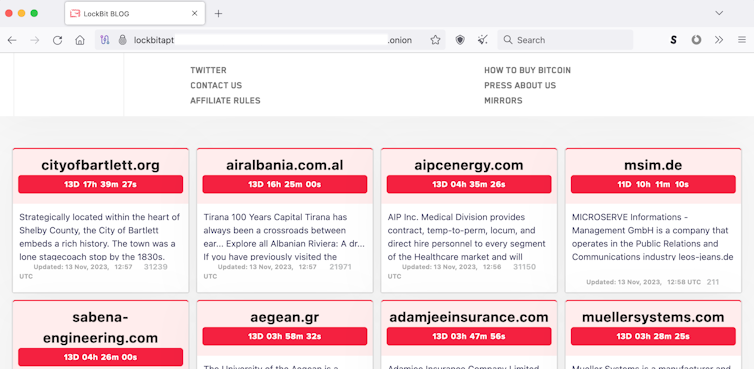Tue 05 December 2023:
While ransomware incidents have been occurring for more than 30 years, only in the last decade has the term “ransomware” appeared regularly in popular media. Ransomware is a type of malicious software that blocks access to computer systems or encrypts files until a ransom is paid.
Cybercriminal gangs have adopted ransomware as a get-rich-quick scheme. Now, in the era of “ransomware as a service”, this has become a prolific and highly profitable tactic. Providing ransomware as a service means groups benefit from affiliate schemes where commission is paid for successful ransom demands.
Although only one of the many gangs operating, LockBit has been increasingly visible, with several high-profile victims recently appearing on the group’s website.
So what is LockBit? Who has fallen victim to them? And how can we protect ourselves from them?
What, or who, is LockBit?
To make things confusing, the term LockBit refers to both the malicious software (malware) and to the group that created it.
LockBit first gained attention in 2019. It’s a form of malware deliberately designed to be secretly deployed inside organisations, to find valuable data and steal it.
But rather than simply stealing the data, LockBit is a form of ransomware. Once the data has been copied, it is encrypted, rendering it inaccessible to the legitimate users. This data is then held to ransom – pay up, or you’ll never see your data again.
LockBit ransomware leaks gigabytes of Boeing data – @Ionut_Ilascuhttps://t.co/VKf3rnJkbVhttps://t.co/VKf3rnJkbV
— BleepingComputer (@BleepinComputer) November 12, 2023
To add further incentive for the victim, if the ransom is not paid, they are threatened with publication of the stolen data (often described as double extortion). This threat is reinforced with a countdown timer on LockBit’s blog on the dark web.
Little is known about the LockBit group. Based on their website, the group doesn’t have a specific political allegiance. Unlike some other groups, they also don’t limit the number of affiliates:
We are located in the Netherlands, completely apolitical and only interested in money. We always have an unlimited amount of affiliates, enough space for all professionals. It does not matter what country you live in, what types of language you speak, what age you are, what religion you believe in, anyone on the planet can work with us at any time of the year.
Notably, LockBit have rules for their affiliates. Examples of forbidden targets (victims) include:
- critical infrastructure
- institutions where damage to the files could lead to death (such as hospitals)
- post-Soviet countries such as Armenia, Belarus, Estonia, Georgia, Kazakhstan, Kyrgyzstan, Latvia, Lithuania, Moldova, Russia, Tajikistan, Turkmenistan, Ukraine and Uzbekistan.
Other ransomware providers have also claimed they won’t target institutions like hospitals – but this doesn’t guarantee victim immunity. Earlier this year a Canadian hospital was a victim of LockBit, triggering the group behind LockBit to post an apology, offer free decryption tools and allegedly expel the affiliate who hacked the hospital.
While rules may be in place, there is always potential for rogue users to target forbidden organisations.
🔴 SickKids, The Hospital for Sick Children, was hacked by Lockbit ransomware group.
⚠️ #Lockbit has published a public apology and a free decryptor. The group also blocked the affiliate who attacked the hospital for violating rules.#dailydarkweb #cybersecurity #ransomware pic.twitter.com/GsRKUbrkz6
— Daily Dark Web (@DailyDarkWeb) January 2, 2023
The final rule in the list above is an interesting exception. According to the group, these countries are off limits because a high proportion of the group’s members were “born and grew up in the Soviet Union”, despite now being “located in the Netherlands”.
Who’s been hacked by LockBit?
High-profile victims include the United Kingdom’s Royal Mail and Ministry of Defence, and Japanese cycling component manufacturer Shimano. Data stolen from aerospace company Boeing was leaked just this week after the company refused to pay ransom to LockBit.

LockBit’s website on the dark web is used to publish stolen data if the ransom is not paid. Screenshot sourced by authors.
While not yet confirmed, the recent ransomware incident experienced by the Industrial and Commercial Bank of China has been claimed by LockBit.
Research says Lockbit has claimed the attack against ICBC⤵️#LockBit #ICBC #ransomware #cyberattack #cybersecurity #infosec https://t.co/s1YSsoJZPO
— CyberNews (@CyberNews) November 10, 2023
Since appearing on the cybercrime scene, LockBit has been linked to almost 2,000 victims in the United States alone.
From the list of victims seen below, LockBit is clearly being used in a scatter-gun approach, with a wide variety of victims. This is not a series of planned, targeted attacks. Instead, it shows LockBit software is being used by a diverse range of criminals in a service model.

How we can protect ourselves
In recent years, ransomware as a service (RaaS for short) has become popular.
Just as organisations use software-as-a-service providers – such as licensing for office tools like Microsoft 365, or accounting software for payroll – malicious services are providing tools for cybercriminals.
Ransomware as a service enables an inexperienced criminal to deliver a ransomware campaign to multiple targets quickly and efficiently – often at minimal cost and usually on a profit-sharing basis.
The RaaS platform handles the malware management, data extraction, victim negotiation and payment handling, effectively outsourcing criminal activities.
The process is so well developed, such groups even provide guidelines on how to become an affiliate, and what benefits one will gain. With a 20% commission of the ransom being paid to LockBit, this system can generate significant revenue for the group – including the deposit of 1 Bitcoin (approximately A$58,000) required from new users.
While ransomware is a growing concern around the globe, good cybersecurity practices can help. Updating and patching our systems, good password and account management, network monitoring and reacting to unusual activity can all help to minimise the likelihood of any compromise – or at least limit its extent.
For now, whether or not to pay a ransom is a matter of preference and ethics for each organisation. But if we can make it more difficult to get in, criminal groups will simply shift to easier targets.
![]()
Jennifer Medbury
Lecturer in Intelligence and Security, Edith Cowan University
Jennifer Medbury lectures in intelligence, information security and counter terrorism at Edith Cowan University. She has over 11 years’ experience as an intelligence analyst and senior intelligence analyst with the Australian Defence Intelligence Organisation and the Western Australia Police Force. Jennifer has a Master of Strategic Affairs from the Australian National University and is a PhD candidate at Edith Cowan University.
______________________________________________
![]()
Paul Haskell-Dowland
Professor of Cyber Security Practice, Edith Cowan University
Professor Paul Haskell-Dowland is the Professor of Cyber Security Practice and Associate Dean for Computing and Security in the School of Science at Edith Cowan University, Perth, Australia. Paul has delivered keynotes, invited presentations, workshops, professional development/training and seminars across the world for audiences including RSA Security, ITU and IEEE. He has appeared on local, national and international media (newspaper, radio and tv) commenting on current cyber issues with a global audience reach of more than 1.5 billion people. His contributions through articles published in The Conversation have reached over 3 million readers – joining the top-50 all-time authors in Australia/New Zealand (top-10 in 2021). Paul has more than 20 years of experience in cyber security research and education in both the UK and Australia.
Paul is the Working Group Coordinator and the ACS/Australian Country Member Representative to the International Federation for Information Processing (IFIP) Technical Committee 11 (TC11 – Security and Privacy Protection in Information Processing Systems); the secretary to IFIP Working Group 11.1 (Information Security Management); a member of the ACS Cyber Security Committee; a Senior Member of the IEEE and the ACS (Certified Professional); and, a Fellow of the Higher Education Authority, BCS and the Australian Information Security Association.
Paul can be followed on Twitter (@pdowland).
______________________________________________________________
FOLLOW INDEPENDENT PRESS:
WhatsApp CHANNEL
https://whatsapp.com/channel/0029VaAtNxX8fewmiFmN7N22
![]()
TWITTER (CLICK HERE)
https://twitter.com/IpIndependent
FACEBOOK (CLICK HERE)
https://web.facebook.com/ipindependent
Think your friends would be interested? Share this story!





